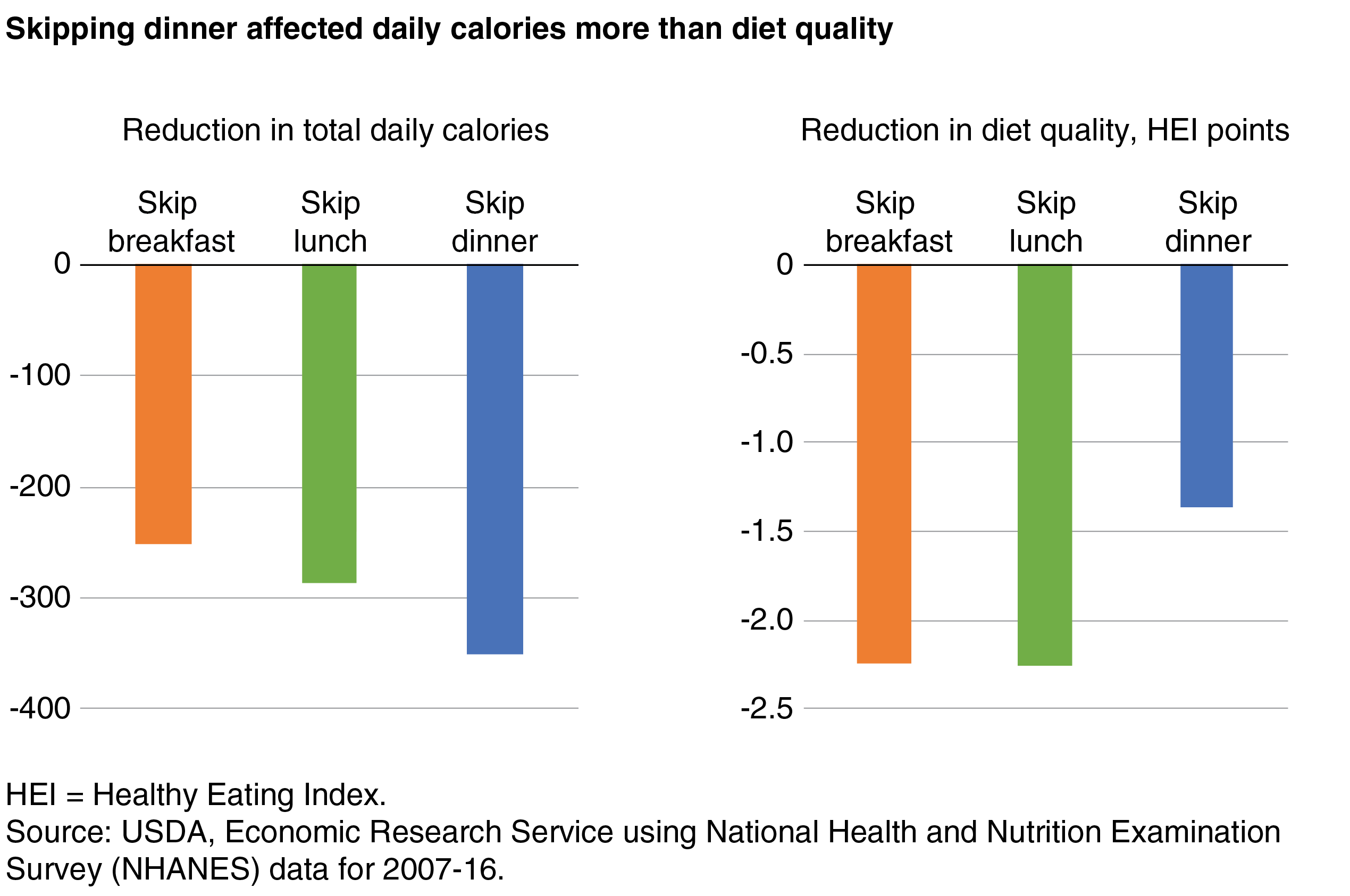
Skipping Breakfast or Lunch Has a Larger Impact on Diet Quality Than Skipping Dinner
- by Eliana Zeballos and Jessica E. Todd
- 7/6/2020
Skipping breakfast and other meals is one behavior studied as a factor influencing weight outcomes and dietary quality. Based on evidence that skipping breakfast reduces total daily caloric intake, some weight-loss recommendations include skipping breakfast (i.e., intermediate fasting) as one strategy to use. USDA's Economic Research Service (ERS) research suggests that while skipping meals can cut calories, this may also reduce diet quality.
USDA and other Federal agencies engage in nutrition education efforts to improve U.S. diets. ERS researchers investigated how skipping meals—breakfast, lunch, and dinner—affects calorie intake and diet quality among U.S. adults to see if this action conflicts with these education efforts and nutrition advice. Along with dietary effects, if the decision to skip a meal is widespread and sustained, there could be economic implications for agricultural producers, food processors, and others in the food supply chain.
The researchers used 2 days of food intake data for U.S. adults from the National Health and Nutrition Examination Survey (NHANES) for 2007-16. These data capture detailed information about the types and amounts of food consumed in 2 non-consecutive days, as well as when each food was eaten and if it was part of a meal or a snack. The researchers used the Healthy Eating Index (HEI), which is a measure of how well a person’s diet conforms with recommendations in the Dietary Guidelines for Americans, to gauge diet quality on each day. The HEI is made up of 12 dietary components encompassing food groups (fruit, dairy, whole grains, etc.) and dietary elements (fatty acids, empty calories, sodium, etc.). The HEI sums to a maximum total score of 100, with a higher score reflecting better diet quality. The score includes nine adequacy components—eight food groups and fatty acids—where higher consumption raises scores. The other three are moderation components—refined grains, sodium, and empty calories—with higher scores reflecting lower consumption and therefore, better diet quality.
Using the 2 days of intake for each survey respondent, the researchers used a statistical model that allowed them to control for individual characteristics that do not change between the 2 days (e.g., demographic variables and unobserved food and eating preferences). What remains are variables that may differ between the 2 days (e.g., the types and amounts of foods consumed and number of meals eaten), allowing the researchers to estimate how changes in day-to-day eating patterns (skipping a meal) affect the calories consumed and diet quality.
The results show that skipping a meal reduced daily caloric intake between 252 calories (breakfast) and 350 calories (dinner). However, skipping breakfast or lunch decreased diet quality by about 2.2 points (about 4.3 percent), while skipping dinner lowered diet quality by 1.4 points (2.6 percent). The dietary components affected by skipping each meal differed:
- Skipping breakfast or lunch reduced the HEI component scores for fruit, whole grains, dairy, and empty calories;
- Skipping lunch also lowered component scores for vegetables and seafood and plant proteins; and
- Skipping dinner reduced component scores for vegetables, greens and beans, dairy, protein food, and seafood and plant proteins, and empty calories.
Out of all three meals, skipping dinner reduced daily calories the most while lowering diet quality the least.
This article is drawn from:
- "The effects of skipping a meal on daily energy intake and diet quality," by Eliana Zeballos and Jessica E. Todd. (2020). Public Health Nutrition, 1-10. doi:10.1017/S1368980020000683.


